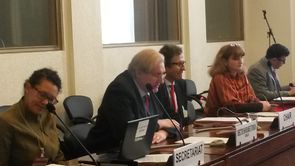The second round table on public awareness, access to information and public participation regarding living modified organisms (LMOs)/genetically modified organisms (GMOs) was held from 15 to 17 November 2016 in Geneva at the Palais des Nations (Salle V). The round table was organized under the leadership of the Government of Austria, and was a joint event of the UNECE Aarhus Convention and the Cartagena Protocol on Biosafety to the Convention on Biological Diversity.
The round table aimed to build countries’ capacities through sharing knowledge, experiences and lessons learned in promoting public awareness, access to information and public participation regarding living modified organisms/genetically modified organisms (LMOs/GMOs) and to make recommendations for future action at the national, regional and international levels. The meeting showcased the Cartagena Protocol’s and the Aarhus Convention’s success stories and further contributed to sustainable development and protecting biodiversity. It also assisted Parties, other interested Governments and stakeholders in furthering relevant sustainable development goals. The event was open to participation of a wide range of stakeholders, such as Governments, media, academia, business and non-governmental organisations.
The outcomes of the event are intended to facilitate the ratification and implementation of the Aarhus Convention’s Almaty Amendment on GMOs and to contribute to the implementation of the Cartagena Protocol on Biosafety's programme of work on public awareness, education and participation concerning the safe transfer, handling and use of LMOs (2011-2015). The outcomes of the event will be presented at the upcoming sessions of both the Meeting of the Parties to the Aarhus Convention (11-13 September, 2017, Budva, Montenegro) and of the Conference of the Parties serving as the meeting of the Parties to the Cartagena Protocol (4 -17 December 2016 - Cancun, Mexico).
To learn more about the event, please read this article: https://www.unece.org/info/media/news/environment/2016/promoting-public-participation-and-transparencry-in-biosafety/doc.html









